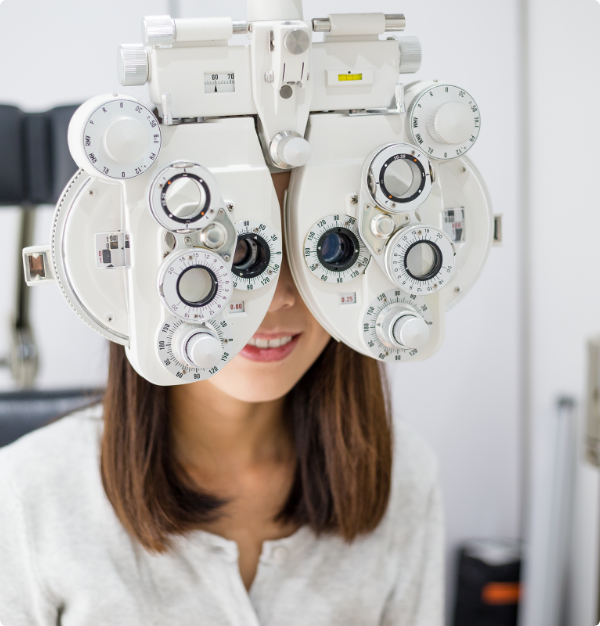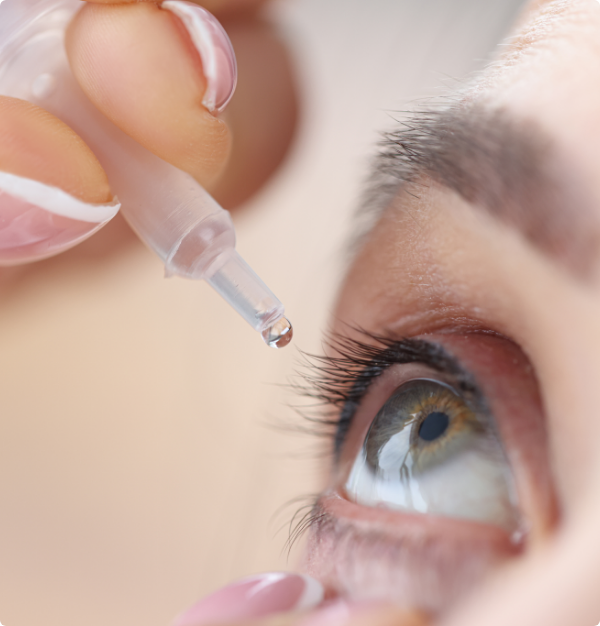Optometry Services
Dedicated to ensuring you receive the vision you deserve
Routine Eye Care
Serving the Weirton & Steubenville Communities
Proper eye care is important for people of all ages and regular eye exams are encouraged for everyone, but especially for those already using glasses or contact lenses. Your vision plays a vital role in your life each and every day, which is why it is so important to take the right steps for maintaining good eye health. At Ohio Valley Vision Center, we provide a variety of services, from comprehensive exams to corrective surgery. We also carry a wide selection of eye frames for our patients as well.
Eye Exams
Comprehensive eye exams are an essential part of maintaining healthy vision and preventing eye problems. Our optometrists at Ohio Valley Vision Center use advanced technology to perform thorough eye exams, which include checking your visual acuity, evaluating your eye health, and testing for common eye conditions such as glaucoma, cataracts, and macular degeneration. These exams also provide an opportunity to discuss any concerns you may have about your vision and address any changes in your prescription. We recommend scheduling a comprehensive eye exam at least once a year to ensure that your eyes remain healthy and that you are seeing your best.


Contact Lenses
The field of optometry changes quickly, and now many more patients are able to enjoy the flexibility of wearing contact lenses to correct their vision. Contact lens exams include tests that are not always performed in regular eye exams, so if you are considering contact lenses, be sure to let us know when you schedule your exam. This allows us to
Prescription Glasses & Sunglasses
Ohio Valley Vision Center is your premier destination for prescription glasses and sunglasses. We are dedicated to providing our customers with the highest quality eyewear and exceptional customer service. Our experienced team of opticians is committed to helping you find the perfect pair of glasses to suit your unique needs and style. If you’re ready to find your next pair of prescription glasses or sunglasses, explore our list of brands below and request an appointment with our team today!
PRESCRIPTION GLASSES
Kate Spade • Pore • Vera Wang • Lily Pulitzer • Kensie • Nine West • DKNY • Calvin Klein • Longchamp • Draper James • Paradigm • COACH • Michael Kors • Liz Claiborne • Fossil • Marchon – NYC • Elliott Ives • Polaroid • Rag N’ Bone • Missoni • Ralph Lauren • Caliber
PRESCRIPTION SUNGLASSES
Pore • Flexon • Carrera • Nike • Calvin Klein • Orginal Penguin • David Beckham • Tommy Hilfiger • Ray Ban • Fossil • Claiborne • Arnette • Marchon-NYC • Brooks Brothers • Armani Exchnage • Elliott Ives • Polaroid • Under Armour • Caliber


Dry Eye Treatment
To keep your eyes healthy, you need to have tears to provide moisture and lubrication. This is not only for your comfort, but it helps with your vision. Tears are secreted by glands around your eyes. When you do not make enough tears, you have a condition called dry eyes.
Amblyopia (Lazy Eye)
Amblyopia is also known as “lazy eye.” Amblyopia usually exhibits in infants and typically only affects one of the eyes.
About two to three percent of people in the United States suffer from some form of amblyopia.
As with most diseases, the earlier amblyopia is detected, the better. Because of this, it is really important to have your eyes checked on a regular basis.
One big sign of amblyopia is being crossed eyed. If you or your child is experiencing this, make sure that you book an appointment with your eye doctor right away. Another common symptom is being able to see properly only out of one eye.
If you are experiencing these symptoms, it is important to make an appointment. Our trusted and qualified staff will perform an examination.
If you are diagnosed with amblyopia, there are lots of treatment options available. Many people have some success with glasses and contacts, though we also offer vision therapy which can be
really helpful.
Improvements are possible at any age. Many people do not realize that there are treatments that can help amblyopia.
Computer Vision
Computer Vision is a relatively new term within the optometry field and refers to eye problems associated with the prolonged use of computers and electronics that use a digital screen. Although it can be temporary, there are times when computer vision can strain the eyes to a degree that permanently affects your vision as well. An existing eye condition can worsen as the eyes try to focus and adjust to a computer screen and precautions should be taken if you spend long hours in front of a computer screen. Some people with an astigmatism will feel completely normal until they get in front of a computer and the condition seems to come back into play. Just as some people use glasses for driving at night there are glasses specifically designed for use with a computer.
Simple factors, such as proper lighting and posture, can make a big difference. Most people don’t realize how hard their eyes are working in front of a computer screen and preventive measures may sound obvious but are frequently overlooked or ignored. Adjusting the screen resolution or checking the brightness and contrast can instantly ease the tension on your eyes. Double check the screen settings for your computer and take breaks if you spend long hours in front of the computer as well. If you have been experiencing blurry vision, dry eyes, eye strain, headaches, neck or back pain, try adjusting the lighting, posture, and the distance in front of your computer screen. If computer vision symptoms persist, call us to set up a consultation and we can do a full diagnosis. We will evaluate the best method in treating your digital eye strain so computer vision does not become an ongoing issue and lead to a bigger eye problem. This eye condition is quite common so don’t hesitate to take the proper steps to improve your vision today.
Detached Retina
The retina is the part of the eye that sends images to your brain. Typically, the retina is firmly against the back of your eye. However the retina can tear or be pulled from its normal position, which can cause blurred or loss of vision. Retinal tears and detachments may require surgery, as they can lead to blindness if left untreated.
Some symptoms of retinal detachment include floaters, flashing lights, or gray moving across your field of vision. These symptoms alone don’t mean that you have a detached retina, but if you are experiencing them it is important to seek help and further testing.
Retinal detachment can occur at any time, although it is more typical in older patients. The likelihood of a detached retina can increase with conditions such as nearsightedness, glaucoma,
previous surgery, or family history.
Retinal tears can usually be treated with laser treatment or cryotherapy. These procedures help place the retina against the back wall of the eye and generally involve little or no pain.
Retinal detachments often require surgery. Types of surgery include pneumatic retinopexy, scleral buckle, and vitrectomy. Retinal detachments need to be treated quickly, so if you may be at risk contact us at (740) 283-3937 today to learn about your options. The longer you wait for treatment, the lower the chances of restoring your normal vision.
Glaucoma
Here at Ohio Valley Vision Center, we are dedicated to providing treatment and surgery for our patients with glaucoma.
Glaucoma is when your intraocular eye pressure is too high. If left untreated, it can cause damage to your optic nerve, which can result in irreversible vision loss. Glaucoma is quite serious and needs to be treated as soon as possible.
There are many ways to treat glaucoma, depending on the severity of the disease. You can use eye drops and/or take pills. There are also some surgeries that can help.
Eye drops can be quite helpful if you catch glaucoma early. The eye drops get absorbed into your bloodstream, so it is important to close your eyes for one or two minutes after you put the drops in. Most eye drops can be uncomfortable at first because they cause either a burning or a stinging sensation, but that should last only a few seconds.
If the eye drops are not helping enough, we can also prescribe pills to be taken orally while you continue to use the drops. These are used to decrease the production of fluid in the eye. These can have some side effects. Any time you go to the doctor, you need to remind him or her that you are on glaucoma medicine because it can interact with and effect other medications.
Surgery for glaucoma is an option when the medications are not helping or you are experiencing too many side effects. We offer laser surgery and traditional surgery.
Laser surgery can be done quickly and efficiently. The most common surgery is a trabeculoplasty, during which we point the laser beam where your eye is supposed to drain. This changes the drainage system, allowing more liquid to drain, lowering your intraocular pressure. It may take a few weeks to get the desired results, and many patients need to stay on their medications for a little bit until we see the full effects of the surgery.
Traditional surgery may be needed if laser surgery is not helpful. The most common surgery is a trabeculectomy. During this procedure, we open a flap in the sclera (the white part of your
eye), allowing your eye to drain much better. Sometimes the flap will close because the body tries to heal the injury. However, this is often very successful and many patients can go off of their glaucoma medications.
If you have any questions about glaucoma, its treatment, or the surgical options we offer, don’t hesitate to contact us today at (740) 283-3937.
Low Vision
Low vision describes vision loss. Even if patients wear eyeglasses or contacts, they may still have trouble with their vision. At times medications and surgery are not able to help this vision loss, though we will do everything we can to ensure that the condition does not progress into blindness. Some diseases that cause low vision include macular degeneration, diabetic retinopathy, inherited retinal degenerative diseases, glaucoma and optic nerve atrophy.
There is no treatment for low vision. Instead, patients are placed into therapy to help them use their current level of sight to continue to do their daily tasks.
Our entire staff is dedicated to ensuring that all of our patients see as clearly as possible. We continue to learn about the latest advances in vision correction to ensure that your vision is the best that it can be.
Ocular Allergies
Many people struggle with allergies which lead to itchy and uncomfortable eyes. However, long-term allergies can cause problems with scratches, ulcers, and even vision problems.
Most people treat their allergies with over-the-counter medications. Antihistamines are commonly used to help. It is also helpful to use eye drops to keep your eyes lubricated, decreasing your chances of harming your eye. Some people find it helpful to flush out their eyes when they have an irritant in it.
However, if over-the-counter medications are not helping or you have pain in your eye, redness, or a lot of discharge, you really need to be seen! We sometimes prescribe artificial tears to help. Antihistamines and decongestants can be used together to make a patient much more comfortable. Mast-cell stabilizers are often prescribed because it prevents the allergic response to allergies, iching and redness and gives more rapid relief within minutes. For severe reactions, allergy shots may be helpful too!
We are here for you if you are having allergies and are struggling with red and itchy eyes. We will go through all of your options until we find what works best for you!
If you have allergies and have questions or would like to be seen, don’t hesitate to contact us today at (740) 283-3937.
Strabismus
Strabismus, also known as cross-eyed or wall-eyed is a vision condition in which a person is not able to align both eyes simultaneously under normal conditions. One or both of the eyes may turn in, out, up, or down. An eye turn may be constant or intermittent. Children that have strabismus will notice that it does not go away on its own.
Up to 5% of all children have some type of strabismus. This is why it is so important for parents to understand the symptoms and know that there are treatment options available. We are proud to work with children that have strabismus, using non-surgical treatment programs that will correct the eye movement and vision-motion deficiencies.
Some of the vision therapy sessions will allow us to assist your child with eye alignment, eye teaming, eye focusing, eye movement, and vision processing.
No two children have the same eyes, and that is why each treatment is tailored to your child’s specific needs. If your child’s symptoms are more extreme in one eye versus the other, we may alter their therapy to ensure the best results possible.
Cataracts
Cataracts are a leading cause of vision issues for people over 40 and are one of the main causes of blindness. A cataract is a clouding of the eye, specifically in the eye’s lens behind the pupil, caused by proteins clumping together. There are different kinds of cataracts, and they can have different causes. Aging or other medical conditions can contribute to the development of cataracts in your eyes.
Cataracts can start small and develop slowly. It may not even be noticeable at first, or you may notice a slight blur to your vision. You may only notice symptoms when looking at bright lights. Cataracts can continue to worsen, and you may only feel the effects once it is well developed.
There are many conditions or factors that can lead to cataracts. Regular eye exams and consultations with your optometrist are the best method of identifying cataracts. If cataracts has developed in your eyes, cataract surgery may be helpful to restore your vision. The surgery is generally successful and the clouded lens can be removed. If you may have cataracts, contact us today to discuss your options with our optometrists.
Conjunctivitis
Red eyes are a sign of ocular inflammation. There are many different diseases that can cause red eye, including conjunctivitis, blepharitis, foreign body, scratches, allergies, and much more. Eyes are red and sometimes itchy and painful. You may notice discharge and trouble with your vision.
It is important to have a thorough examination with a history to help determine what is causing your red eye. There are times when primary physicians can handle red eye, though there are cases which need to be seen by an ophthalmologist.
We are here for you when your primary care physician is unable to help. We should be seen if you are having vision loss with your red eye. If regular eye drops are not helping, you may need to see us to prescribe topical steroids. It is also important to come to an ophthalmologist when you are having an eye injury or a possible sore on your eye. We also need to be seen if you have recently had eye surgery. Anytime that you feel you need to be seen by an ophthalmologist, don’t hesitate to call!
Diabetic Retinopathy
Here at Ohio Valley Vision Center, we are proud to help our patients who develop diabetic retinopathy.
Diabetes comes with a lot of other problems, affecting your whole body. Even your eyes can become affected by the disease. It is so common that it actually has a name: diabetic retinopathy.
Diabetic retinopathy is a disease of the retina, which is involved in your vision. Your retina is necessary so that everything that you see is transferred to your brain.
Diabetic retinopathy usually continues to get worse, especially if your diabetes is not under control, though it can get worse even with controlled diabetes. For this reason, we recommend having regular check-ups so that we can monitor your eyes. During the progression of the disease, you may not even notice any symptoms which makes it even more important to come in regularly.
The first stage of the disease involves the blood vessels in your eyes. They get really weak and leak blood into your eyes. If it continues and leaks into the center of your eye, you will have blurry vision. Your body will try to compensate by making new blood vessels but they are also weak, allowing more blood to leak into your eye. Your body might also try to form scar tissue which causes the retina to move away from your eyes and can lead to legal blindness.
If you have diabetes and would like to have your eyes examined, feel free to contact us today at (740) 283-3937.
LASIK
LASIK stands for laser in-situ keratomileusis and is a popular surgery to correct vision problems. LASIK can help people who are nearsighted or farsighted as well those who have astigmatism.
LASIK works by reshaping the cornea with a laser, which allows light to be focused onto the retina. A laser is used to create a small flap is in the cornea, which is peeled back so another laser can reshape the cornea. The flap is then returned to its original position, and the surgery is complete.
LASIK is becoming quite popular because it works so well. It has a high success rate. The procedure itself is quick, taking only about ten minutes. Most patients require only local anesthetics, which is given in eye-drop form.
The procedure is pretty painless, and you won’t have to deal with stitches or bandages. Most people see a difference in their vision right away. If needed, we can make minor adjustments in the future.
Every surgery has risks, so it is important to discuss the surgery, side effects, and recovery with your eye doctor so you can make an informed decision about whether or not the procedure is right for you.
If you have any questions or would like to set up a consult, don’t hesitate to contact us today at (740) 283-3937.
Macular Degeneration
Macular pigment is the yellow pigmented spot that is in the center of your eye’s retina. This acts like sunglasses, protecting your macula from harmful light so that it can continue to do its job.
The thickness of the macular pigment depends on the person; as you age, the density of your pigment can change. Other factors, such as your lifestyle and diet, can also affect the thickness of your macular pigment.
It can be helpful to determine how thick your macular pigment is because it can be associated with your risk of developing macular degeneration. Low pigment can be a risk factor for macular degeneration. If you suffer from it, the sooner that you know, the easier it is to treat; meaning you will have less side effects.
We are proud to offer testing to help our patient’s determine the thickness of their macular pigment. We use only the latest technology so that our patient’s can find out if they are at risk for macular degeneration.
If you have any questions about macular pigment optical density, don’t hesitate to contact us today at (740) 283-3937.
PRK
Many people decide to proceed with LASIK and PRK surgery. For this reason, people need to understand the surgical process they will experience.
Before you have surgery, we recommend having a thorough examination by your family eye doctor. During this time, we will discuss your options and recovery. We want you to know exactly what to expect after the surgery. Before you leave, we will answer any questions you may have.
After you are referred to a surgeon and have the surgery, you will need postoperative care. This is the time for co-management. We will work together with your surgeon to help cover your care after surgery. You will be able to follow up with us instead of going back to your surgeon.
By offering LASIK and PRK co-management, we are hoping to give you the results that you deserve without all of the stress. You can simply come back to our office, where you are comfortable, to get the care that you need after surgery.
If you have any questions about LASIK and PRK co-management, don’t hesitate to contact us today at (740) 283-3937.
Client Reviews

I recently had an unfortunate accident involving my eye, and Ohio Valley Vision Center got me in right away to be taken care of. Everyone at the office was super friendly and Dr. Jagela was awesome – thank you so much for everything! Injuring your eye can be very scary, but everyone was so wonderful and compassionate – I will be recommending them to everyone.
Jessica V.

I’ve been going to Dr. Jagela/ Dr. Howenstein/Ohio Valley Vision Center since 1987 and will not go anywhere else! Their very helpful, friendly staff really cares about your vision and your health and they come very highly recommended by me. I’ve been wearing glasses/ contacts for 31 years and not only do I get the best on the optical end but I’ve been a diabetic for 27 years and Dr. Jagela has only done the best at caring for my eyes on themedical end especially when I had retinopathy due to pregnancy. I can not say enough great things about this place!
Maureen B.

Fantastic office, very pleasant office personnel, I was completely satisfied with my entire experience. Very knowledgeable trustworthy. I would highly recommend for all of your eye care.
Jules D.

